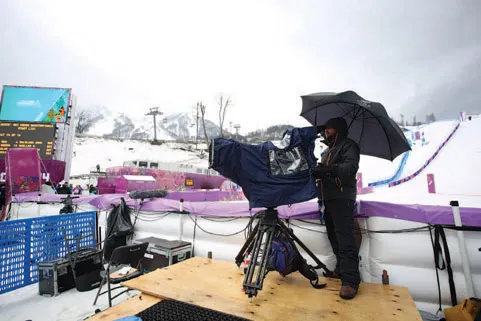Today, many events are covered by live remotes. Live events grab the viewers’ attention and help them feel as though they are witnessing history as it happens. The crew is also impacted by a live event. With no way to edit their work, there is a palpable need to get it right the first time. The result is a heightened sense of teamwork and concern for quality. Without adequate preparation, “live” can kill the broadcast production.
Live-to-Tape
While video tape is rarely used today, live-to-tape is still used to describe recording the event as though it is live. This allows the option of additional editing, fixing problem issues as needed. Even live-to-tape remote productions can take different forms. Most remote productions utilize a mobile production unit outfitted with live switching gear, video recorders, graphics, and space for the crew. However, some sport productions can be covered with multiple electronic news gathering (ENG) cameras. In this case, the entire production must be edited in postproduction. While live switching is faster, it requires an expensive remote unit, more equipment, longer setup time, and more crew members. Multiple ENG cameras require a postproduction facility and take more time in the postproduction process, but in the end are generally less expensive.
Remote versus Studio Production
While the studio can provide the director with the most control over the situation, the advantage to a remote production is the ability to capture the event as it is happening as well as capturing the ambience and energy of the event. Producers involved in the event from the beginning may be able to help select the event location so that the best visual background for the event is obtained. If the production is not far away, at times it can even be less expensive to shoot in the field than in a studio setting.
In the studio, you have the ultimate control over sound, lighting, electrical power, and weather, but in the field they can become your biggest problems. If there is not enough light or electric power, you need to provide it. If the public address system or other unwanted sounds interfere with your audio, you need to change your microphone positions. If the weather gets bad, the event may get cancelled.
As mentioned earlier, your crew must be chosen carefully. However, on a remote, the production may be somewhat dependent on people that you do not have any control over, who do not necessarily understand the television production process. This could include personnel such as police and venue management and technical personnel. It becomes essential that the production crew cultivate good relationships with these people in order to facilitate the access that is required.
The mobile unit’s size may also cause some issues on a remote production location. These could include traffic blockage and parking spaces for the truck. Another associated issue is that parking spaces may not be available for the crew near the mobile unit. Parking space near the truck may also be required for a port able generator that provides power or even backup power.
If the production is occurring far from the home base, management has to be concerned with providing food, lodging, and transportation for the crew, which can add considerable expense to the production costs.
Often, location permits are required for a crew to shoot in remote locations. Obtaining those permits can be a time-consuming process.
When the advantages of a remote production outweigh the disadvantages, then you hit the road, with crew and equipment in tow.
Interview: Rob Reichley, Senior Vice President/Executive Producer
Interview by Georgia Clark
What are your responsibilities?
I am responsible for coordinating all production including live events, ½ hour shows, and documentaries, productions for our company. These shows are then broadcast on networks like ESPN, ACC, FOX, etc.
What do you like about your job?
I like the creation of content as a producer. I enjoy preparing for a game and then sitting down at the event, knowing that I have prepared for it, being able to make split second decisions during a game, and the adrenaline high is just amazing. I work with some amazing people.
What are some of the challenges you have to deal with?
Finding a balance between work and family can be difficult. You just can’t miss games…so that has impact o...

